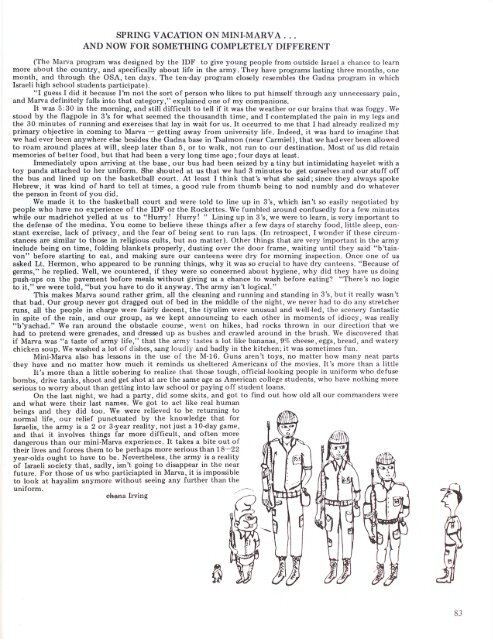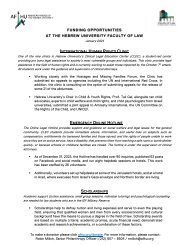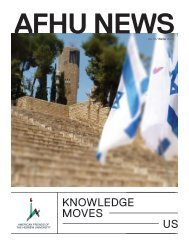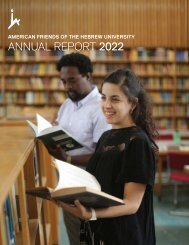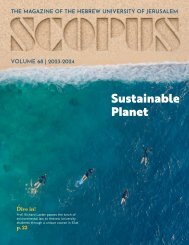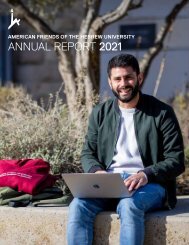Create successful ePaper yourself
Turn your PDF publications into a flip-book with our unique Google optimized e-Paper software.
SPRING VACATION ON MINI-MARVA . ..<br />
AND NOW FOR SOMETHING COMPLETELY DIFFERENT<br />
(The Marva program was designed by the IDF to give young people from outside Israel a chance to learn<br />
more about the country, and specifically about life in the army. They have programs lasting three months, one<br />
month, and through the OSA, ten days. The ten-day program closely resembles the Gadna program in which<br />
Israeli high school students participate).<br />
“I guess I did it because I ’m not the sort of person who likes to put himself through any unnecessary pain,<br />
and Marva definitely falls into that category,” explained one of my companions.<br />
It was 5:30 in the morning, and still difficult to tell if it was the weather or our brains that was foggy. We<br />
stood by the flagpole in 3’s for what seemed the thousandth time, and I contemplated the pain in my legs and<br />
the 30 minutes of running and exercises that lay in wait for us. It occurred to me that I had already realized my<br />
primary objective in coming to Marva — getting away from university life. Indeed, it was hard to imagine that<br />
we had ever been anywhere else besides the Gadna base in Tsalmon (near Carmiel), that we had ever been allowed<br />
to roam around places at will, sleep later than 5, or to walk, not run to our destination. Most of us did retain<br />
memories of better food, but that had been a very long time ago; four days at least.<br />
Immediately upon arriving at the base, our bus had been seized by a tiny but intimidating hayelet with a<br />
toy panda attached to her uniform. She shouted at us that we had 3 minutes to get ourselves and our stuff off<br />
the bus and lined up on the basketball court. At least I think that’s what she said ;since they always spoke<br />
Hebrew, it was kind of hard to tell at times, a good rule from thumb being to nod numbly and do whatever<br />
the person in front of you did.<br />
We made it to the basketball court and were told to line up in 3’s, which isn’t so easily negotiated by<br />
people who have no experience of the IDF or the Rockettes. We fumbled around confusedly for a few minutes<br />
while our madrichot yelled at us to “Hurry! Hurry! ” Lining up in 3’s, we were to learn, is very important to<br />
the defense of the medina. You come to believe these things after a few days of starchy food, little sleep, constant<br />
exercise, lack of privacy, and the fear of being sent to run laps. (In retrospect, I wonder if these circumstances<br />
are similar to those in religious cults, but no matter). Other things that are very important in the army<br />
include being on time, folding blankets properly, dusting over the door frame, waiting until they said “b ’taiavon”<br />
before starting to eat, and making sure our canteens were dry for morning inspection. Once one of us<br />
asked Lt. Hermon, who appeared to be running things, why it was so crucial to have dry canteens. “Because of<br />
germs,” he replied. Well, we countered, if they were so concerned about hygiene, why did they have us doing<br />
push-ups on the pavement before meals without giving us a chance to wash before eating? “There’s no logic<br />
to it,” we were told, “but you have to do it anyway. The army isn’t logical.”<br />
This makes Marva sound rather grim, all the cleaning and running and standing in 3’s, but it really wasn’t<br />
that bad. Our group never got dragged out of bed in the middle of the night, we never had to do any stretcher<br />
runs, all the people in charge were fairly decent, the tiyulim were unusual and well-led, the scenery fantastic<br />
in spite of the rain, and our group, as we kept announcing to each other in moments of idiocy, was really<br />
“b’yachad.” We ran around the obstacle course, went on hikes, had rocks thrown in our direction'that we<br />
had to pretend were grenades, and dressed up as bushes and crawled around in the brush. We discovered that<br />
if Marva was “a taste of army life,” that the army tastes a lot like bananas, 9% cheese, eggs, bread, and watery<br />
chicken soup. We washed a lot of dishes, sang loudly and badly in the kitchen; it was sometimes fun.<br />
Mini-Marva also has lessons in the use of the M-16. Guns aren’t toys, no matter how many neat parts<br />
they have and no matter how much it reminds us sheltered Americans of the movies. It’s more than a little<br />
It’s more than a little sobering to realize that those tough, official-looking people in uniform who defuse<br />
bombs, drive tanks, shoot and get shot at are the same age as American college students, who have nothing more<br />
serious to worry about than getting into law school or paying off student loans.<br />
On the last night, we had a party, did some skits, and got to find out how old all our commanders were<br />
and what were their last names. We got to act like real human<br />
beings and they did too. We were relieved to be returning to<br />
normal life, our relief punctuated by the knowledge that for<br />
Israelis, the army is a 2 or year־3 reality, not just a 10-day game,<br />
and that it involves things far more difficult, and often more<br />
dangerous than our mini-Marva experience. It takes a bite out of<br />
their lives and forces them to be perhaps more serious than 18—22<br />
year-olds ought to have to be. Nevertheless, the army is a reality<br />
of Israeli society that, sadly, isn’t going to disappear in the near<br />
future. For those of us who particiapted in Marva, it is impossible<br />
to look at hayalim anymore without seeing any further than the<br />
uniform.


